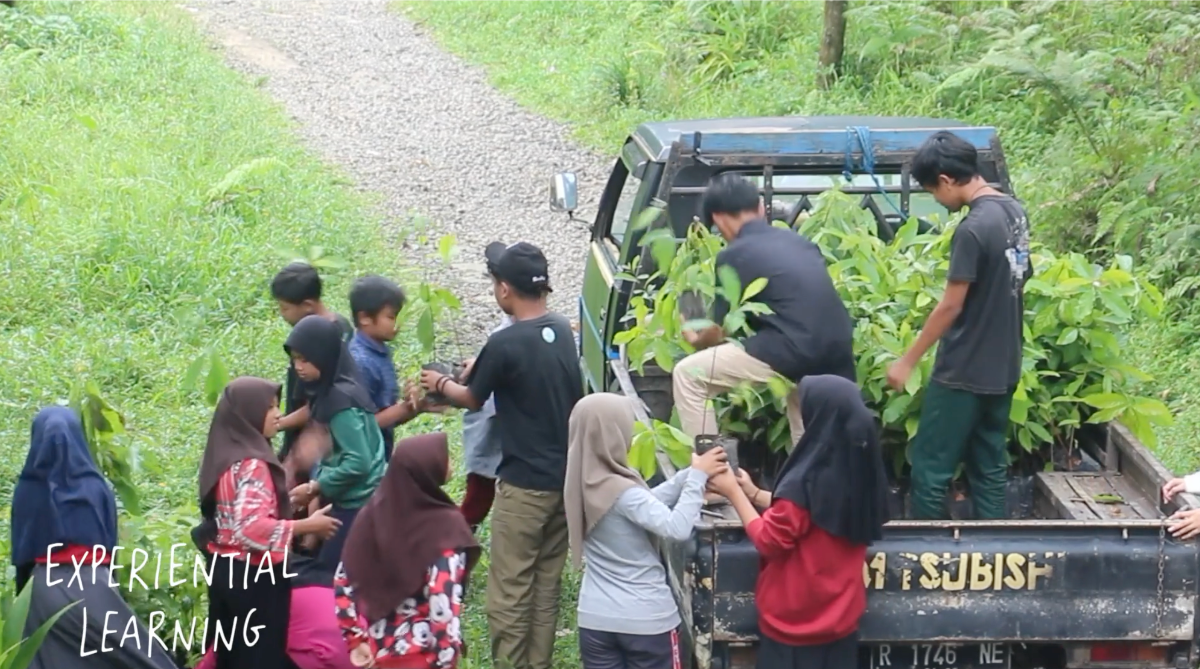Marcia McKenzie & Nicola Chopin (MECCE Project), with thanks to Tom Lowe (Polygraph Productions Research Communication)
The International Panel on Climate Change has concluded that we have a ‘rapidly closing window of opportunity to secure a liveable and sustainable future’ on this planet. And while we have the scientific and technological knowledge to ensure a liveable planet for all into the future, we are missing the social and political will to address climate change at the scale, and with the urgency required.
This is where climate communication and education, or CCE, comes in. Effective climate communication and education catalyzes social understanding and will for political change; setting action in motion at local and global scales.
But what makes CCE effective? Common approaches to climate change education assume that providing more information on the science of climate change will lead to action. But this has been shown to not always be effective, and can contribute to high levels of anxiety, hopelessness, or denial, rather than meaningful change.
The Monitoring and Evaluating Climate Communication and Education Project set out to better understand what makes effective CCE in mobilizing action throughout the globe. Through dozens of case studies, we have learned that while there is no one size fits all approach to CCE, there are often shared qualities.
Common to these is a focus on relationships: with the places we are in and how they are being affected by climate change; relationships among people in and across communities; and relationships with the stories we tell about the past and our possible futures.
This video highlights the shared characteristics of quality CCE, drawn from analysis of MECCE Project case studies.
Places
The case studies show the importance of connecting climate communication and education to the PLACES where people live, both in understanding the local impacts of climate change, and in getting involved in taking action to address climate change impacts.
A whole-school approach to climate communication and education is the focus for the building of a new ‘earthship’ school in Mar Chiquita, Argentina. With a ‘Biosphere Reserve’ designated lagoon as the heart of the area, the students, families and wider community built an off the grid sustainable school infrastructure out of recycled materials.
Students participate in real-world project-based learning through engagement with the sustainable school building and the surrounding lagoon.
A case study about the Dënesųłıné Yatı – Ɂedacho Kué Camp highlights Indigenous land based learning with youth in the Canadian North. The camp takes place within the Thaidene Nëné Indigenous Protected Area, the homeland of the Łutsël K’é Dene First Nation.
The camp integrates storytelling by Elders, Dene games, and language learning with harvesting, navigation, survival skills, and environmental monitoring led by Ni Hat’ni Dene guardians.
Camp participants develop a deep understanding of climate change impacts, participate in stewardship of the land; and connect across generations to sustain and build cultural identity and knowledge.
A case study of farmers in two communities with different climate impacts in the Eastern Highlands Province of Papua New Guinea identifies that, sometimes, climate communication needs to be hyper-local.
It also identified instances of traditional knowledge adapting to new climate realities. For example, farmers noticed that the timing for when to plant crops no longer aligned with their prior knowledge of the land, and that shifts were needed.
This case underscores the need to adopt local language dialects and alternative communication media, such as video, in working with communities without print-based literacy; in developing climate communication and training strategies.

Photo Credit: UNESCO Chair on Education for Sustainability and Global Citizenship, Universidad de San Andrés

Photo Credit: Thaidene Nëné Department, Łutsël K’é Dene First Nation

Photo Credit: Research and Conservation Foundation of Papua New Guinea

Photo Credit: Department of Geography Education, University of Education, Winneba, Ghana

Photo Credit: National Research and Innovation Agency of The Republic of Indonesia

Photo Credit: Neighbours United
Communities
Connecting climate change to the existing values and priorities of COMMUNITIES is a central quality of effective climate communication and education.
In the rural community of Kuliyaa in northern Ghana women’s involvement in dry-season gardening highlights the role of peer-to-peer learning, learning from Elders, and how climate change learning and adaptation can lead to shifts in gender roles in the community. With droughts and shorter rainy seasons impacting rural livelihoods, men are migrating in search of jobs. Women are adapting by teaching each other dry season gardening to provide food and therefore gaining more economic independence for themselves and their families.
At Madrasah Tsanawiyah located on steep forest slopes in Gununglurah village in Indonesia, junior high students are taking part in CCE that is tailored for their community’s needs and values, including integrating religious and spiritual teachings.
Classes with experiential learning on agroforestry, biodiversity, and climate change are held in the mornings in the forest to allow children to work in fields half the day, which is helping reduce school dropout rates.
The CCE at Madrasah also incorporates Indigenous knowledge, such as students learning how their ancestors cared for the environment through Javanese wayang, a traditional form of storytelling through puppets made from plant materials.
A case study based on the communities of Trail and Cranbrook in British Columbia, Canada, focuses on the role of politics and local economies in how communities approach climate change. The non-profit ‘Neighbours United’ uses door knocking as an education strategy to engage people in rural, industry-based towns in conversations about climate and energy.
This ‘deep canvassing’ can increase support for climate action by having vulnerable and non-judgemental conversations to shift understandings of how action aligns with existing values.
Stories
The STORIES we tell about our places, communities, and climate change, are central to making it matter in relation to the things we already value, so that we feel the need for action.
One case study focuses on the climate narratives of girls in the Western Cape townships in South Africa, most of whom participate in the program ‘Black Girls Rising’. The girls are co-researchers in creating effective climate communication. Together, they identify and answer their ‘Big Questions’ on climate change, such as:
“Climate change impacts rich people differently: How does climate change impact people living in low income communities?”
In doing so, they learn the importance of shifting narratives away from those of Global North in how climate change is discussed. They also explore the justice impacts of the digital divide, where communities have different access to digital information on climate change, and the importance of intergenerational engagement and youth voice, where young people learn from Elders, but also find it necessary–and difficult–to challenge adult views on climate change.
The girls propose that stories through song, poetry, performance, and animation are perfect ways for understanding and inspiring action on climate change.
A radio station in Bundlekhand, one of the poorest regions in India, is harnessing the power of story by integrating local experiences and perspectives. In this case study, Development Alternatives explored how using participatory programming and entertainment media can further climate change knowledge.
Abstract climate change concepts are translated into more easily understandable messages that use local language and region-specific cultural norms. The radio station also makes an effort to ensure programming represents the voices of economically and socially marginalised communities and women.
In 200 secondary schools across the United Kingdom, SOS-UK’s ‘Teach the Teacher’ is helping students engage their teachers in learning and in seeing the need for climate education for all. Peer-to-peer onboarding provides the students with the skills to deliver a professional development workshop for their own teachers, in their own school.
Teachers deepen their understanding of climate education across all subjects, and are better able to engage with climate anxiety.
Students develop their confidence, presentation and oracy skills, and leadership capacity. The case study uses digital storytelling to share students’ reflections through student-produced films.

Photo Credit: Lucy Cavendish College, University of Cambridge

Photo Credit: Lucy Cavendish College, University of Cambridge

Photo Credit: Centre for Environmental Education

Photo Credit: Students Organising for Sustainability UK
Summing Up
Relationships with places, communities, stories: these are key elements of effective CCE. Despite these commonalities, these elements are engaged in diverse ways across audiences, sectors, and regions around the world.
In many places, CCE has relied on particularly innovative or extra-committed leaders, which means it is often included in a patchwork of decentralized programs and initiatives. A key challenge, then, is building effective CCE at scale through policy and other means of mainstreaming.
Policy action is critically important for advancing CCE across institutions, systems, and societies, including in centering the leadership already being taken by Indigenous communities, youth, and women.
Thank you to these and other case studies for the inspiration they provide in helping us understand what CCE in all its forms can be and do, in a diversity of places and communities. We hope they also help you imagine possibilities to advance climate literacy and action where you are.
This article comprises the script of Place, Community, Stories: Quality Climate Communication and Education. Watch the video now.
About the AuthorS

Marcia McKenzie Professor and Associate Dean Sustainability in the Faculty of Education, University of Melbourne. She is Director of the Monitoring and Evaluating Climate Communication and Education (MECCE) Project (www.mecce.ca), University of Saskatchewan. Her research areas include global education policy research, geographies of education, and climate and sustainability education, including in relation to place, mobilities, and affect theory. She is co-author/editor of six books, including Researching Global Education Policy: Diverse Approaches to Policy Movement (Policy Press, 2024) and Navigating the Research-Policy Relationship: Studies in Environmental and Sustainability Education (2024, Routledge); and co-edits the book series Lobal Global Issues in Education (Routledge) and Studies in Education and the Environment (Palgrave).

Nicola Chopin is Project Manager for the MECCE Project and has been the Project Manager for the Sustainability and Education Policy Network (SEPN) since the Network was established in 2012. She has also contributed to many UNESCO and SEPN reports and lead planning for the 2019 Annual Conference of the Canadian Network for Communication and Environmental Education (EECOM), the first national conference in Canada to focus on climate change education. She holds a Masters in Applied Social Psychology, and her work has a focus on evaluation, monitoring, and community-university partnerships. Nicola has coordinated multi-methods research in a wide variety of social science areas including climate change education, sustainability education policy, sustainability education, health science education, quality of life, poverty, homelessness, crime prevention, and community perceptions of crime.

Tom Lowe is a video producer and digital communicator with a passion for accurate insight and creative communication. He is an experienced researcher, having worked in research positions in the UK and Australia, including the Tyndall Centre for Climate Change Research, the Bushfire Cooperative Research Centre and the Ipsos Social Research Institute. He worked as a Senior Social Research Officer for the Victorian State Government’s Department of Sustainability and the Environment before creating Polygraph Productions Research Communication in 2013 in an effort to improve the uptake and understanding of research.


